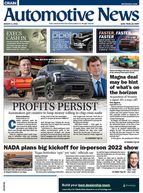Bombast and hyperbole are as deeply rooted in the auto industry as is the internal combustion engine. Yet automakers appear to find it easier to ditch fossil fuels than they do their love for wild predictions. But not all overstatements are created equal, and some deserve further scrutiny from investors and business partners, as well as regulators.
We've previously taken issue with dangerous marketing claims that willfully mislead the public by overstating the technical capabilities of driver-assist systems, especially from Tesla, which now aims to sell a so-called Full Self-Driving service — even though the system still lacks important safety features, including driver monitoring.
Tesla also has been a source over the years of overly optimistic forecasts for electric vehicle pricing, profitability and market penetration. But Tesla survived publicly discussing stretch goals and is now the world's most valuable automaker. No wonder others are embracing their most EV-optimistic outlooks, such as General Motors' hope to sell only zero-emission vehicles in the U.S. by 2035.
Volkswagen Group CEO Herbert Diess is the latest to fan the flames of white-hot optimism. He projected that the nascent transition to electrification would propel his brands, including the likes of Porsche and Audi, to a combined 10 percent U.S. market share. Everyone has to have a goal, but aiming to gain more than 5 points of share in nine years seems pointlessly unrealistic.






